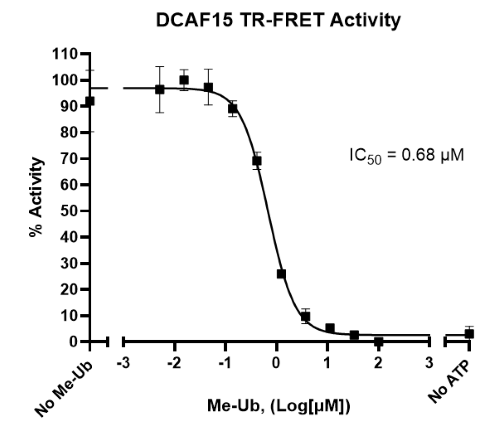DCAF15 Intrachain TR-FRET Assay Kit
The DCAF15 Intrachain TR-FRET Assay Kit is a sensitive high-throughput screening (HTS) TR-FRET (Time Resolved Fluorescence Resonance Energy Transfer) Assay Kit designed to measure DCAF15 (DDB1 and CUL4-associated factor 15) auto-ubiquitination activity in a homogeneous 384-reaction format. It utilizes Europium-labeled Ubiquitin (donor) and Cy5-labeled Ubiquitin (acceptor) to complete the TR-FRET pairing. This assay measures poly-ubiquitination since both the TR-FRET donor and acceptor are incorporated into poly-ubiquitin chains formed on DCAF15. As a homogenous assay, it requires no time-consuming washing steps, making it especially suitable for HTS applications as well as real-time kinetics analyses.

Figure 1. DCAF15 Intrachain TR-FRET Assay Kit schematic
Need us to run inhibitor screens or profile your compounds against DCAF15? Check out our Ubiquitination Screening Services.
- Fluorescent microplate reader capable of measuring Time Resolved Fluorescence Resonance Energy Transfer (TR-FRET)
- Adjustable micropipettor and sterile tips
- Rotating or rocker platform
| Catalog # | Name | Amount | Storage | |
| 80301 | UBE1 (UBA1), FLAG-tag (E1)* | 50 µg | -80°C | Avoid multiple freeze/ thaw cycles |
| 80314 | UbcH5b, His-Tag (E2)* | 60 µg | -80°C | |
| 101497 | DCAF15/Rbx1/CUL4B/ DDB1/complex (E3)* | 130 µg | -80°C | |
| 78307 | TRF Ubiquitin Mix (200x) | 50 µl | -80°C | |
| ATP (4 mM) | 2 x 1 ml | -80°C | ||
| U2 Assay Buffer | 2 x 10 ml | -80°C | ||
| White, nonbinding Corning, low volume microtiter plate | Room Temp | |||
* The initial concentration of enzyme is lot-specific and will be indicated on the tube containing the protein.
Covalent conjugation to ubiquitin (Ub) is one of the major post-translational modifications that regulates protein stability, function, and localization. Ubiquitination is the concerted action of three enzymes: a Ub-activating enzyme (E1), a Ub-conjugating enzyme (E2), and a Ub ligase (E3). The specificity and efficiency of ubiquitination are largely determined by the E3 enzyme, which directs the last step of the Ub-conjugating cascade by binding to both an E2∼Ub conjugate and a substrate protein. This step ensures the transfer of Ub from E2∼Ub to the substrate, leading to its mono- or poly-ubiquitination.
DDB1 and CUL4-associated factor 15 (DCAF15) is a protein that associates with CUL4A or CUL4B to form a complex with E3 ligase activity. DCAF15 interacts with and ubiquitinates the major transcription factor ZEB1, which is involved in the activation of the epithelial-mesenchymal transition (EMT) in metastatic cancer cells. Furthermore, DCAF15 is necessary for ubiquitination of the RNA splicing factor RBM39, the degradation of which leads to enhanced sensitivity of hematopoietic and lymphoid cancer cells to drug-induced cytotoxicity. Therefore, DCAF15 is an attractive potential drug target for cancer therapy. Like most E3 ligases, DCAF15 ubiquitinates itself.


